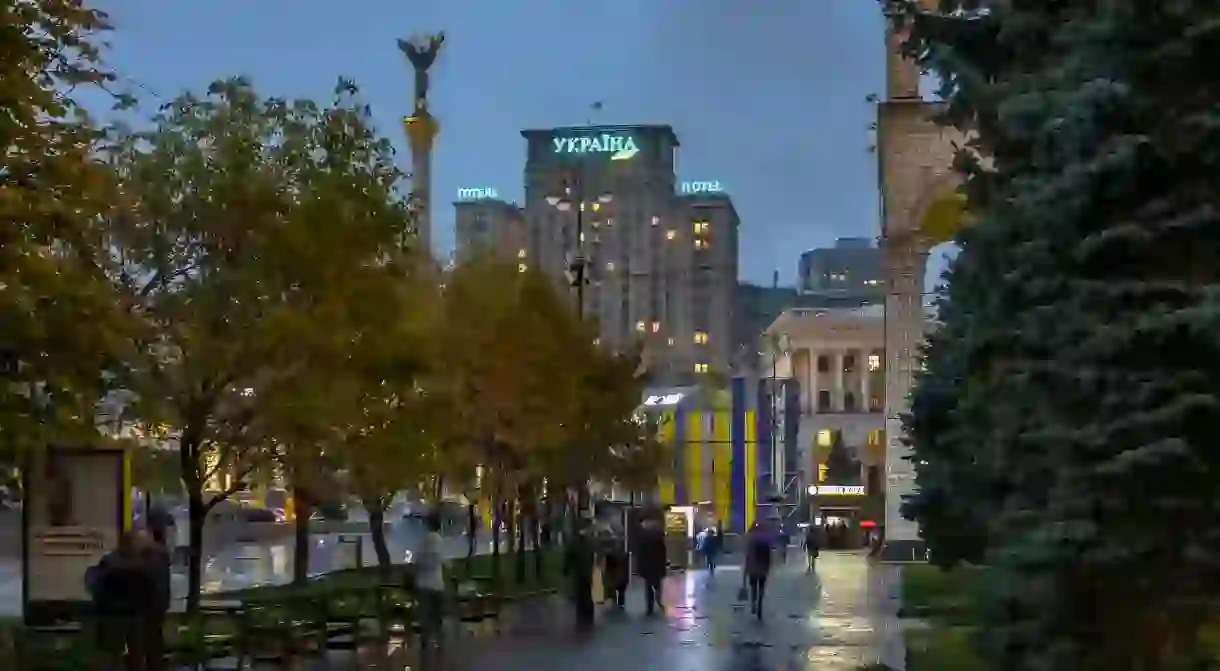Explore Kiev Through This QR-Code Treasure Hunt

Like any city around the globe, Kiev has a range of symbols that represent its character and make it recognizable worldwide. However, not so many people know the origin of these symbols nor the story behind them. In order to help increase understanding about them, bronze casts of the symbols have been placed around the city.
The project Shukay/шукай (“search” in English), launched by Manager of Kiev, and in particular by its founder Yulia Bevzenko, enables an exploration of the city’s history through QR code. Although it is a challenge to find these mini-statues, you’ll be rewarded when you do. Once you scan the QR code located on an adjacent table, you’ll be able to read the story of that object and get a better understanding of the city’s culture. And don’t forget to post an image with the hashtag #шукай.
Chicken Kiev
Chicken Kiev is a must-try dish when in Kiev, the roots of which trace back to the beginning of the 20th century. At that time, it was a unique interpretation of the côtelette de volaille, stuffed with butter, greens and spices. It has quickly become a culinary symbol of the city that has since conquered the world’s best restaurants. Venues in London are no exception.
Maria Zankovetska Street, 15/4, Kiev, Ukraine
A post shared by Валерія (@fesyakyiv) on Jul 22, 2018 at 11:23am PDT
Kiev chestnuts
The streets of Kiev are adorned with chestnut trees, and it seems like they’ve been there forever. In Soviet times, its bloom was the main element in the city’s emblem. Moreover, it continues to be a decoration on the famous Kiev Cake, which is often brought home as a souvenir from the Ukrainian capital.
Khreschatyk Street, 36, Kiev, Ukraine
A post shared by shukay.kyiv (@shukay.kyiv) on Apr 26, 2018 at 10:38pm PDT
Kiev Cake
One of the many excellent reasons to visit Kiev is to try Kiev Cake, which you won’t be able to find in any other city in Ukraine. Invented accidentally as the result of a mistake, this creamy, crispy and extremely delicious sweet treat is bought by the thousands every single day. The proper one is prepared by the confectionery brand Roshen, which has a network of shops around Kiev. But remember that in order to get one, you should head to the shop in the morning.
Khreschatyk Street, 29/1, Kiev, Ukraine
A post shared by Елена Белорусская (@elenabelorusskaya) on Jul 22, 2018 at 4:09am PDT
Kiev candied fruit
According to Manager of Kiev, the production of candied fruit began in the late 18th and early 19th centuries. The slices of fruit were repeatedly boiled in sugar syrup, dried and rolled in powdered sugar. At that time, it was a delicacy, the production of which was passed down through the generations. Nowadays, this dish is known as succade.
Andriivskyi Descent, 2D, Kiev, Ukraine
A post shared by shukay.kyiv (@shukay.kyiv) on Apr 27, 2018 at 6:20am PDT
The Kiev carriage
This mini-sculpture is a symbol of the first self-propelled carriage in the Ukrainian capital. It was a 19th-century sensation, and the story about it was published in the local newspaper. Want to know the full story of the Kiev carriage? Then go to Khreschatyk Street, 15/4, find the symbol and scan the QR code.
Khreschatyk Street, 15/4, Kiev, Ukraine
A post shared by shukay.kyiv (@shukay.kyiv) on May 29, 2018 at 5:38am PDT
The Kiev tram
It was in Kiev where the first electric-powered tram in the Russian Empire began to run. Thus, the steam tram was replaced in 1892. Its evolution was so rapid that by the beginning of the 20th century, the tram was an ordinary thing for locals. The network of tramways was expanded and soon reached almost every district of Kiev.
Sportyvna Ploscha, 1, Kiev, Ukraine
A post shared by ninokviolon (@ninokviolon) on Jul 21, 2018 at 12:48am PDT
The plinth brick
There are almost 1,000 cathedrals and churches in Kiev, the first of which was built way back in the 11th century. Most of these monuments were constructed in the Byzantine style and were constructed using plinth bricks. For example, Saint Sophia Cathedral and the Golden Gates of Kiev (entrance gates to ancient Kiev) are made of it. Thus, the brick is deservedly placed on the list of Kiev’s symbols.
Dehtyarna Street, 6, Kiev, Ukraine
A post shared by 150932 (@alraunya) on Jul 7, 2018 at 11:04pm PDT
The fountains of Kiev
Kiev can definitely be called the city of fountains. Therefore, not surprisingly, Shukay has devoted a mini-sculpture to one of them. The legendary Theremin Fountain, located behind the Golden Gates of Kiev, performed practical functions for residents: people used the water from it in the 19th and 20th centuries.
Volodymyrska Street, 40/2, Kiev, Ukraine
A post shared by ЮЛИЯ БЕВЗЕНКО (@yuliabevzenko) on Jul 13, 2018 at 12:21pm PDT













